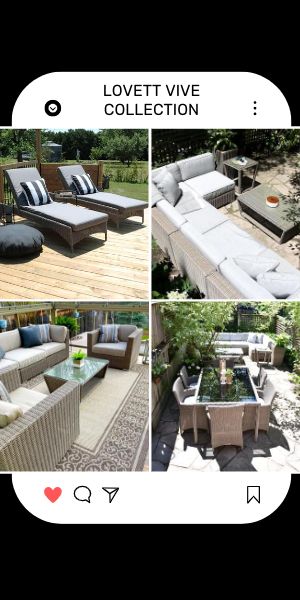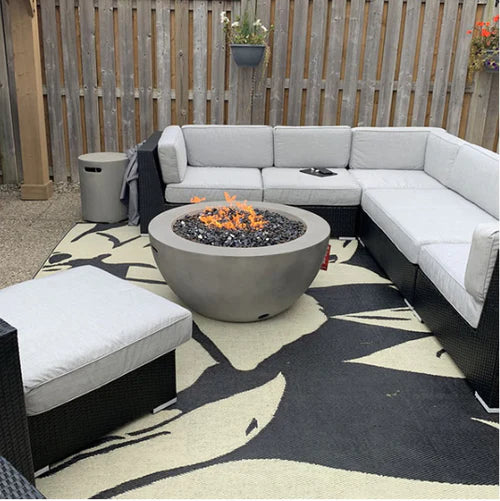In today's world, creating an eco-friendly outdoor space has become increasingly important. By adopting sustainable practices and utilizing environmentally friendly products, you can contribute to the preservation of the planet while enjoying your outdoor oasis. In this blog post, we will explore a range of strategies and ideas to help you create an eco-friendly outdoor space that aligns with your values and promotes environmental conservation. From incorporating recycled materials to implementing energy-efficient lighting and water-saving techniques, you'll discover practical ways to make your outdoor space more sustainable.
Understanding Sustainability & the Environment
Before diving into specific practices, it's essential to understand the concepts of sustainability and the environment. We'll explore the importance of environmental conservation, the impact of human activities on the planet, and the benefits of adopting sustainable practices in our daily lives. By gaining a deeper understanding of these principles, you'll be better equipped to make conscious choices for creating an eco-friendly outdoor space.
Designing an Eco-Friendly Outdoor Space
Creating an eco-friendly outdoor space starts with thoughtful design and planning. We'll discuss the principles of sustainable landscaping and eco-conscious design, which emphasize the use of native plants, organic gardening methods, and the preservation of natural resources. You'll learn how to integrate sustainable elements into your outdoor space while maintaining aesthetics and functionality.
Incorporating Recycled Materials
One of the key aspects of sustainable design is the use of recycled materials. We'll explore various options for incorporating recycled materials into your outdoor space, such as recycled plastic furniture, reclaimed wood decking, and repurposed decorative accents. Discover how these materials not only reduce waste but also add a unique touch to your outdoor decor.
Energy-Efficient Lighting Solutions
Energy-efficient lighting is an essential component of an eco-friendly outdoor space. We'll discuss the benefits of LED lighting, solar-powered fixtures, and smart lighting systems. Learn how to choose the right lighting options for different areas of your outdoor space and maximize energy savings while enhancing the ambiance of your evenings outdoors.
Water-Saving Techniques for Outdoor Spaces
Conserving water is crucial for sustainability, especially in outdoor spaces where irrigation and watering play a significant role. We'll explore water-saving techniques such as drip irrigation systems, rainwater harvesting, and the selection of drought-tolerant plants. By implementing these strategies, you can reduce water consumption without compromising the health and beauty of your outdoor plants and landscaping.
Eco-Friendly Outdoor Furniture
Choosing eco-friendly outdoor furniture is another important aspect of creating a sustainable outdoor space. We'll explore furniture options made from recycled materials, sustainably sourced wood, and low-impact manufacturing processes. Discover how these choices not only contribute to environmental conservation but also provide durability and comfort for your outdoor seating and lounging areas.
Upcycling and Repurposing
Embracing the principles of upcycling and repurposing allows you to unleash your creativity while reducing waste. We'll provide ideas and inspiration for repurposing old items into functional and decorative elements for your outdoor space. From turning pallets into planters to transforming vintage containers into unique outdoor accents, upcycling offers endless possibilities for adding a personal touch to your eco-friendly outdoor oasis.
Composting and Organic Gardening
Creating an eco-friendly outdoor space often goes hand in hand with organic gardening and composting. We'll discuss the benefits of composting, including reducing food waste and enriching soil fertility. Learn how to start your own composting system and utilize the nutrient-rich compost to nourish your outdoor plants and gardens naturally.
Nurturing Native Plants and Wildlife (continued)
your outdoor space, including their adaptability to the local climate, resistance to pests, and ability to provide habitat and food sources for native wildlife. We'll explore different types of native plants and offer tips on how to incorporate them into your landscape design. Creating a welcoming environment for birds, butterflies, and other pollinators will not only enhance the biodiversity of your outdoor space but also contribute to the overall health of the ecosystem.
Rainwater Harvesting and Irrigation
Conserving water is a critical component of sustainability. We'll delve deeper into the practice of rainwater harvesting, which involves capturing and storing rainwater for later use in irrigation. Learn about different rainwater harvesting systems, from simple rain barrels to more complex underground cisterns, and understand how to integrate them into your outdoor space. By utilizing harvested rainwater for watering your plants, you can reduce reliance on municipal water sources and contribute to water conservation efforts.
Choosing Sustainable Outdoor Decor
Beyond furniture, there are numerous options for sustainable outdoor decor. We'll explore eco-friendly materials for decorative elements such as planters, sculptures, and outdoor art. From recycled metal accents to reclaimed wood sculptures, these sustainable decor choices will add style and character to your outdoor space while minimizing environmental impact.
Educational Signage and Environmental Awareness
Promoting environmental awareness is a powerful way to inspire others and create a ripple effect of sustainability. We'll discuss the importance of educational signage in your outdoor space, such as plaques or information boards that highlight sustainable features and practices. By sharing knowledge and encouraging visitors to embrace sustainable habits, you can contribute to a broader movement of environmental consciousness.
Monitoring and Maintaining Sustainability
Once you have established your eco-friendly outdoor space, it's essential to monitor and maintain its sustainability. We'll provide tips on regular maintenance tasks, such as proper waste management, eco-friendly cleaning practices, and ongoing plant care. By staying vigilant and proactive, you can ensure that your outdoor space continues to thrive in a sustainable manner.
In conclusion, the importance of sustainability and environmental consciousness in creating an eco-friendly outdoor space cannot be overstated. By embracing sustainable practices and utilizing eco-friendly products, you not only contribute to the preservation of the planet but also create a harmonious and inviting outdoor oasis for yourself and others to enjoy.
Throughout this article, we have explored a wide range of strategies and ideas to help you transform your outdoor space into a sustainable haven. From incorporating recycled materials and energy-efficient lighting to practicing water-saving techniques and nurturing native plants, each step you take towards sustainability brings you closer to a more balanced and environmentally responsible lifestyle.
By choosing eco-friendly outdoor furniture made from recycled materials or sustainably sourced wood, you make a conscious decision to reduce waste and support responsible manufacturing practices. Not only does this contribute to the longevity of your outdoor furniture, but it also sets an example for others to follow, encouraging the adoption of sustainable choices in outdoor decor.
Furthermore, embracing the principles of upcycling and repurposing allows you to infuse your outdoor space with unique and personal touches while reducing waste. By giving new life to old items and transforming them into functional and decorative elements, you showcase your creativity and demonstrate that sustainability can be both stylish and inventive.
Composting and organic gardening play a vital role in sustainable outdoor spaces. By composting organic waste and utilizing the nutrient-rich compost in your garden, you create a closed-loop system that reduces the need for chemical fertilizers and fosters healthy soil and plant growth. Additionally, incorporating native plants into your landscape design not only supports local ecosystems but also provides habitat and food sources for native wildlife, promoting biodiversity and ecological balance.
Rainwater harvesting and efficient irrigation methods allow you to conserve water and minimize reliance on traditional water sources. By capturing rainwater and utilizing it for watering your plants, you not only reduce water consumption but also play a part in mitigating the effects of drought and water scarcity. This proactive approach to water conservation demonstrates your commitment to sustainable living.
In your eco-friendly outdoor space, consider incorporating educational signage that raises awareness about sustainable features and practices. By sharing information and inspiring others to embrace sustainability, you become an agent of change, promoting environmental consciousness and encouraging others to make conscious choices in their own outdoor spaces.
Remember, sustainability is an ongoing journey. Regular monitoring and maintenance of your eco-friendly outdoor space are essential to ensure its continued sustainability and longevity. By practicing proper waste management, employing eco-friendly cleaning methods, and staying vigilant in plant care, you can ensure that your outdoor space remains vibrant and sustainable for years to come.
By implementing the ideas and strategies discussed in this article, you have the power to make a positive impact on the environment and inspire others to follow suit. Your eco-friendly outdoor space becomes a testament to the fact that sustainability and aesthetics can coexist harmoniously, demonstrating that by making conscious choices, we can create a more sustainable and environmentally conscious world.
So, go ahead and create your own eco-friendly outdoor oasis. Let it be a reflection of your values, a sanctuary that nurtures both your well-being and the planet we call home. Together, let us embark on this journey towards sustainability and embrace the beauty of an eco-friendly outdoor space.














